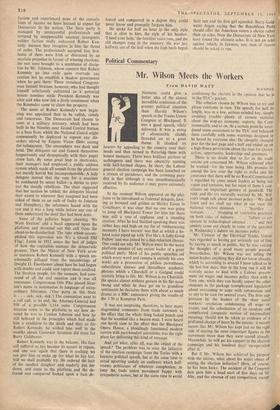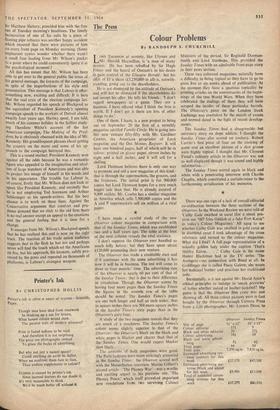Political Commentary
Mr. Wilson Meets the Workers
From DAVID WATT At the moment Wilson appeared on the plat- form to be introduced as fraternal delegate, look- ing as bronzed and golden as Shirley Eaton in Goldfinger, it was clear that no one was going to jump off Blackpool Tower for him but there was still a roar of applause and a standing ovation. After he had finished speaking there was rather less, and high on my list of 'embarrassing moments I have known' was that at which a be- lated voice piped up with 'For He's A Jolly Good Fellow' and was joined by a thin reluctant chorus. One could see why Mr. Wilson must be the worst platform speaker of any extant leader of a great political party. Most of his public speeches (of which every word and comma is entirely his own work) are a procession of pitiless parentheses, subordinate clauses and threadbare academic phrases which a Churchill or a Gielgud could scarcely bring to life. Mr. Wilson is no Churchill. He speaks almost without gesture in his flat nasal twang and when he does get on to grandiose sentiments he declaims them with about as much drama as a BBC announcer giving the results of the 3.30 at Kempton Park.
It was not surprising, therefore, to hear many disgruntled comments from trade unionists to the effect that the whole thing lacked punch and that he sounded like a beaten man. I even heard one harsh view to the effect that the Blackpool Opera House, a ploddingly functional modern cavern with part-boudoir accretions, was the right place for delivering this kind of message.
And yet what, after all, was the object of the speech? The problem was to seize the initiative of the election campaign from the Tories with a keynote political speech, but at the same time to avoid upsetting unduly an audience which half- resents politicians of whatever complexion; to keep the trade union movement happy with sympathetic noises, but at the same time to avoid
confirming the electors in the opinion that he is in the TUC's pocket.
The solution chosen by Wilson was to try and please everyone in turn. The speech, for half its length, was in a low, serious-minded key, simply avoiding trouble—plenty of earnest statistics about the stop-go economy, exports, the Com- monwealth, and so on. At a certain point he intro- duced some assurances to the TUC and balanced them carefully with some warnings designed to be heard by everyone else. He abruptly changed gear for the last page and a half and ended up on a high-flown peroration about the time for choice, action, opportunity, leadership and greatness.
There is no doubt that so far as the trade unions are concerned Mr. Wilson achieved what he wanted—for the time being. His promise to amend the law over the right to strike and his assurance that there will be no Royal Commission is regarded by some union leaders as being too
vague and tentative, but for most of them it con- stitutes an important gesture of goodwill. The
rank and file are naturally worried by Mr. Wil- son's tough talk about incomes policy—'We shall listen and we shall say what in our view the national interest demands . . . ,"Saeritice . .
restraint . . . ,"dropping of restrictive practices on both sides of industry . . . ,"failure to co-
operate in technological advance . . . ,' and this anxiety came out clearly in some of the speeches in Wednesday's &bate on incomes policy.
'Mr. Cannon of the Electrical Trades Union was regarded as having got serionsly out of line by saying as much in public, but he was voicing the thoughts of a good many people present. Nevertheless, Mr. Wilson was not telling the union leaders anything they did not know already, which is, according to several I have talked to in the last few days, that in the long run it will be scarcely easier to deal with a Labour govern- ment on wages and incomes policy than with a Tory one, while they can hardly expect the other elements in the package (complicated legislation about re-training to cope with automation and so on) to be seen for several years. The firm sup- pression by the leaders of the sheet metal workers' resolution condemning all wage re- straint, and the substitution of an anodyne and complicated composite motion of intermediate meaning, should not be taken as evidence of a profound change of heart by the unions : it merely means that Mr. Wilson has kept just on the right side of scaring the most important figures in the movement more than they were scared already.
Meanwhile, he will get his support in the election campaign and his hundred days' co-operation after it.
But if Mr. Wilson has achieved his purpose with the unions, what about his wider object of seizing the election initiative? Here, of course, he has been lucky. The accident of the Congress date gave him a head start of five days on Sir Alec, and the absence of any competition, except
Sir Matthew Slattery, provided him with the free run of Tuesday morning's headlines. The timely incineration of one of his suits by a piece of flaming pipe tobacco was another happy accident Which ensured that there were pictures of him on every front page on Monday morning. (Some unpleasant cynics wonder whether there wasn't a small fuse leading from Mr. Wilson's pocket to a point where he could conveniently ignite it at the psychological moment.) All this has meant that Mr. Wilson has been able to get over to the general public the sense of his general message, the keynote of the campaign, in spite of the imperfections of his style and Presentation. This message is that Labour is offer- something new, exciting and difficult. It is here that the real crux of the election campaign lies. Mr. Wilson regarded his speech at Blackpool as the equivalent of President Kennedy's opening campaign speech to the workers of Detroit almost exactly four years ago. Having spent, I am told, much of his summer holiday in the Scillies study- ing Theodore White's account of the last American 'campaign, The Making of the Presi- dent, he is obviously obsessed with the idea of Mr. Kennedy. His grandiloquent phrases about getting the country on the move and some of his ap- proach to the campaign betrayed this.
This is a sound instinct. President Kennedy won against all the odds because he was a romantic figure who appealed to the imagination and ideal- ism of large numbers of Americans and was able to project this image of himself in his words and in his appearance. The trouble for Labour is, of course, firstly that Mr. Wilson does not look or Speak like President Kennedy, and secondly that he is not employing Ted Sorenson and Arthur Schlesinger as his speech-writers. But his best chance is to work on these lines. Against the Conservative argument that comfort and pru- dence demand that we stick to the old firm there IS no real answer except an appeal to the emotions and the general feeling that it is time for a change.
It emerges from Mr. Wilson's Blackpool speech that he has realised this and is now on the right track. The reaction of his trade union audience suggests that in the flesh he has not and perhaps never will find the touch which set the Americans on fire, but his approach, his keynote, safely pro- cessed by the press and repeated on thousands of Platforms, is Labour's strongest weapon.































 Previous page
Previous page